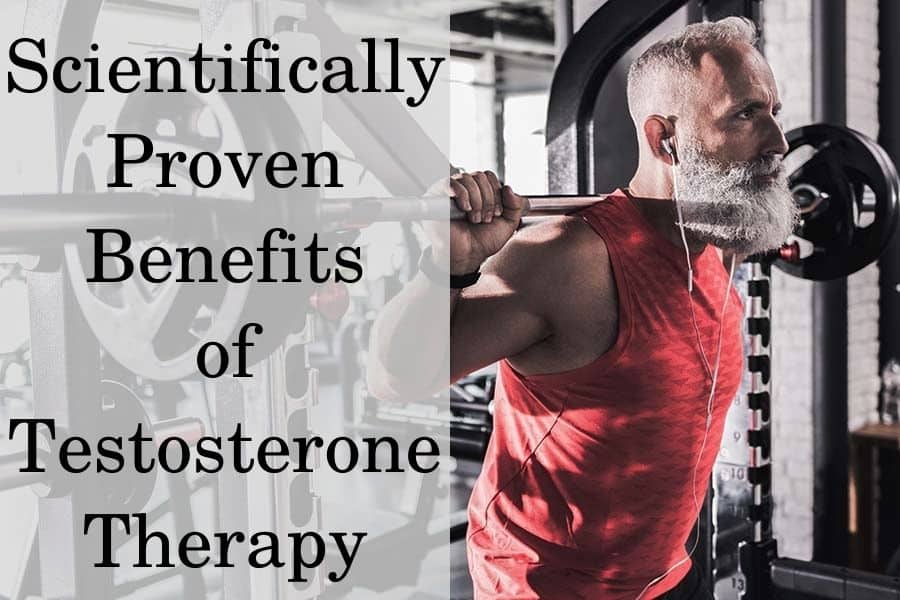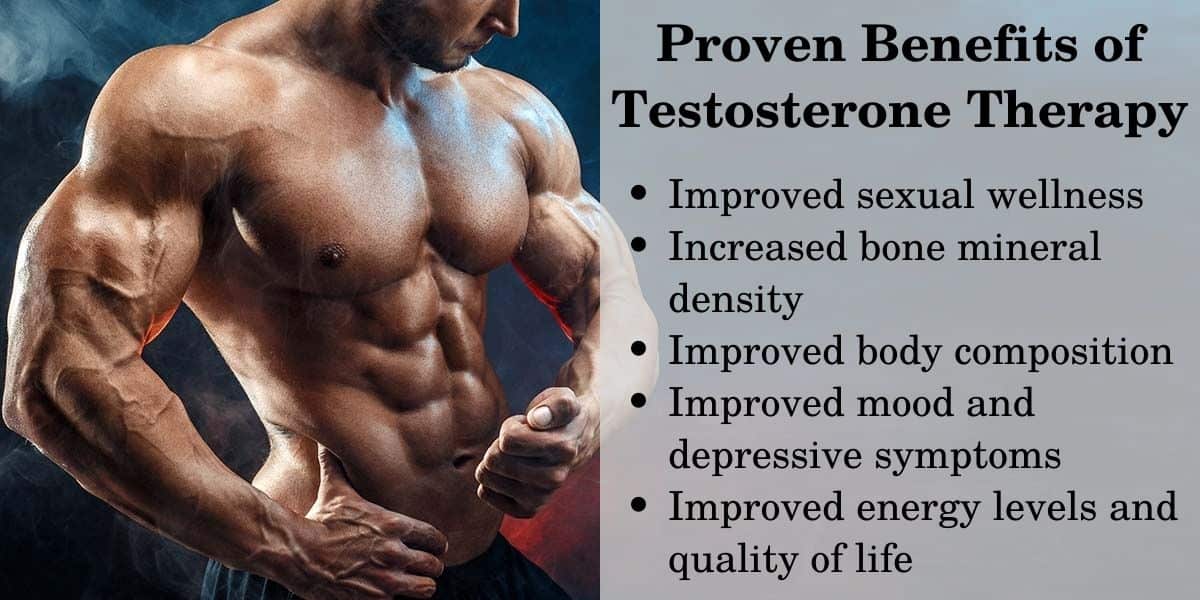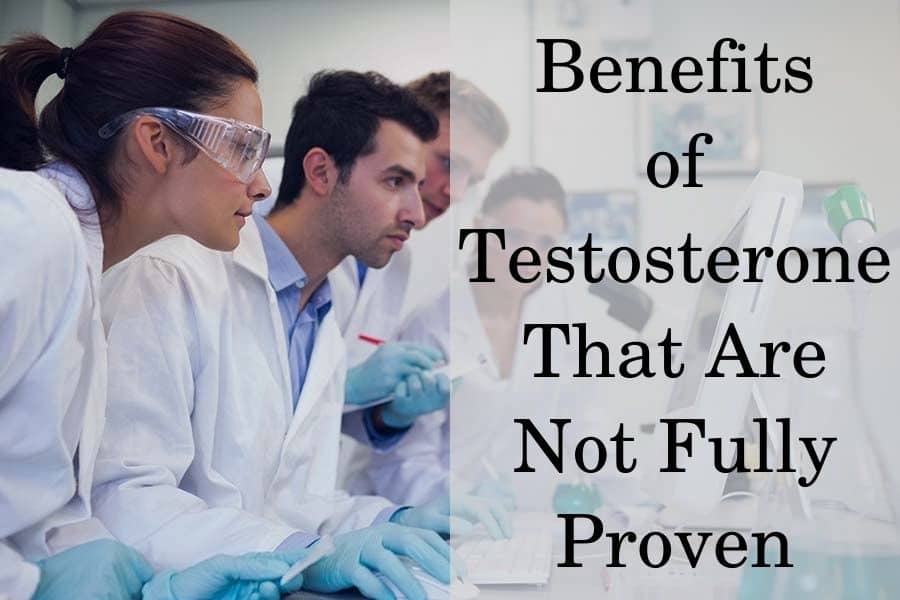Testosterone is the main male sex hormone. It stimulates the development of masculine features in boys while in adults, it supports the normal sexual function, fertility, energy levels, muscle mass, bone mineral density, mood, and cognition.
That’s why a decline in T levels will have a negative effect on almost every aspect of your health and well-being. You may experience sexual problems, infertility, osteoporosis, muscle loss, brain fog, mood changes, anemia, and more. Men with low T may also be at an increased risk of cardiovascular problems and heart attacks.
In such cases, one of the most effective and widely recommended treatments to manage these symptoms is testosterone replacement therapy (TRT). TRT can literally help you get your life back as it will restore your vigor, energy levels, sexuality, and quality of life to levels comparable to those before you developed a deficiency.
Yet, TRT is not a miracle cure, as the medication will only resolve symptoms and complaints related to low T levels. Furthermore, TRT will not provide an additional boost to your health or well-being if you are already healthy and your testicles are functioning normally.
Proven benefits of testosterone
The main effect of TRT is restoring your testosterone levels back to normal, which eventually leads to all the benefits of the therapy.
In fact, the treatment has been proven to provide benefits for almost all symptoms of low T, including sexual health, bone mineral density, body composition, mood, cognition, overall well-being, and quality of life.
TRT may even help support the function of your heart since men with untreated hypogonadism appear to be at an increased risk of heart problems. Infertility is the only symptom of low T which cannot be treated effectively.
The aim of the therapy is to achieve and maintain serum testosterone levels in the mid-high range of the physiological references. Starting testosterone injections can achieve such serum levels immediately, but it will usually take several weeks or months until the benefits start to occur.
If you have low T and symptoms, it is worth considering TRT. The treatment is highly recommended as it will help restore your productivity, energy levels, sexuality, mood, and much more.
Increased sexual activity
Testosterone has a crucial role in male sexuality and sexual wellness. Most notably, it stimulates libido and sexual desire. In addition, T appears to have a complex effect on erections, as the hormone increases the activity of both nitric oxide synthase (NOS) and phosphodiesterase type 5 (PDE5).
These enzymes have opposite effects on erections since the first one initiates the process while the other one terminates it. Thus, scientists suggest that testosterone works by synchronizing the erection process with sexual desire.
Since NOS activation is highly dependent on T levels, erections are impossible without at least small amounts of the hormone in the bloodstream.
Men with low T levels often experience problems achieving or maintaining an erection. Furthermore, reduced libido and decreased sexual satisfaction are quite common.
Taking TRT can restore normal testosterone levels in the bloodstream and help you manage these symptoms
Trials in hypogonadal men report that improved sexual desire is one of the first benefits when starting TRT. The scientists reported that both erectile function and libido started increasing in the 3rd week of TRT and the benefits reached a maximum in 6-9 weeks.
By helping you maintain erections for longer, TRT may also help improve your sexual performance. Furthermore, there may be an effect of TRT on orgasms in men. Researchers suggest that men had better orgasmic function during the therapy.
Increased bone mineral density
Testosterone is an anabolic hormone, and these effects extend to bone tissue. The hormone works by reducing the excretion of calcium through the kidneys and stimulating bone cells (osteoblasts) to produce new bone tissue.
The result is maintaining good bone mineral density and a potentially reduced risk of fractures. Thus, hypogonadal men who do not receive treatment are at an increased risk of bone loss. The process is slow and it may take years of untreated hypogonadism, but eventually, patients can develop osteopenia and osteoporosis.
TRT can successfully prevent or reverse these conditions, as long as the therapy has a sufficient duration. Studies report that the initial increase in mineral density takes at least 6 months of therapy and maximum benefits are achieved within 2-3 years.
6 months of testosterone therapy may be sufficient to increase the bone mineral density of the vertebrae in the lumbar spine of hypogonadal men by 5%. Also, 12 months of TRT may be effective in increasing both spine and total hip bone mineral density in elderly men.
Improved body composition
Testosterone plays a major role in regulating the body composition of adolescent and adult males. The male sex hormone is anabolic for muscle tissue but catabolic for fats.
Men with low T and hypogonadism often experience muscle loss, decreased strength, and reduced endurance. Furthermore, they become more likely to gain extra body fat as their metabolic rate decreases.
TRT helps restore lost muscle by increasing hypertrophy in muscles on a cellular level. The hormone stimulates the androgen receptor in the nuclei of the cell, thus making it produce more proteins. This increases both the size and the strength of muscles.
At the same time, testosterone stimulates the release of fatty acids from adipose tissue and their uptake by muscle cells, which helps fat loss and provides energy for the already increased muscle protein synthesis.
In fact, the increased muscle protein synthesis during TRT boosts the metabolic rate and energy demands of the body by up to 10% according to studies.
Therefore, TRT also helps to lose abdominal fat. Excess abdominal fat is called visceral obesity and it is a major risk factor for insulin resistance, type 2 diabetes, and heart disease.
Improved mood
Thanks to the presence of androgen receptors in the brain, testosterone levels also have an impact on mood. That’s why low T may even increase your risk of depression.
Some researchers even suggest that low T is a major cause of treatment-resistant depression, and all men with such a condition should undergo screening for hypogonadism.
Adding TRT to the treatment regime of these patients can significantly improve their response to antidepressants. TRT may potentiate the response thanks to the effects of the hormone on neurotransmitters such as serotonin and gamma-aminobutyric acid (GABA).
For example, serotonin is also a common target for many antidepressants which work by increasing its levels in the brain. Men with higher T levels generally tend to have higher cerebral serotonergic tonus as well.
A recent meta-analysis that included a total of 1890 men, either with normal or low T levels, reported that TRT significantly reduces symptoms of certain forms of depression, including major depression and dysthymia.
The benefits of TRT on mood and depressive symptoms usually begin after the 2nd month of therapy and continue to improve until they reach a maximum within 8 months.
Increased quality of life
Low T can significantly decrease your quality of life, due to symptoms such as erectile dysfunction, bone loss, depression, weight gain, and fatigue.
On the other hand, TRT can help you manage the symptoms, and thus, the different benefits of TRT for physical and mental health will ultimately result in improved quality of life.
One of the most commonly used methods to assess the quality of life in men with hypogonadism is the Aging Male Symptoms (AMS) questionnaire.
For example, a 12-month study investigating the effects of TRT in 120 hypogonadal men reported that the treatment improved both mental health and physical health scores.
Mental health improvement was also statistically significant when adjusted for the baseline characteristics of the patients. The benefits included increased vitality, social functioning, and reduced agitation.
Another study also reported that more than 50% of the participants on TRT experienced improved energy levels and overall well-being, which correlates with a higher quality of life.
Other studies on hypogonadal men also reported that 6 months of TRT led to a dramatic improvement in quality of life, including scales of sociability, concentration, agitation, self-confidence, listlessness, and anxiety.
The largest study so far which investigated the effect of TRT on quality of life covered 999 men with low T and reported improvements in sexual, somatic, and psychological health, which were sustained over 36 months.
Potential but not currently proven benefits
Many users may stumble upon claims of additional benefits and promising effects of TRT, which are presented as 100% proven and real. Yet, some of these statements may be based on preliminary studies such as in vitro, animal experiments and small uncontrolled clinical trials.
Thus, they are yet to be approved by the scientific community and such claims may give false hope to the patients.
Furthermore, some of the potential benefits of TRT are still under investigation since the current evidence appears conflicting. This includes the effects of TRT on heart health, cholesterol, blood sugar control, and cognition which are likely but not completely proven.
Improved heart health
Testosterone may potentially improve the function of the cardiovascular system by affecting the myocardium (heart’s muscle).
Studies clearly show that untreated low T increases the risk of heart disease and cardiovascular events
Furthermore, research suggests that TRT given to patients with chronic cardiovascular conditions (such as heart failure) improves the function of the myocardium.
Yet, the research does not show that TRT reduces mortality in such patients. Similar studies appear conflicting, as some of the research suggests there may be a benefit while a few trials also suggest a potential risk in men with heart disease.
A 2014 meta-analysis found no causal association between TRT and the risk of cardiovascular-related death, heart attacks and strokes in hypogonadal men.
Improved cholesterol levels
TRT may also help lower total cholesterol levels, which is an indicator of cardiovascular risk. High total cholesterol is associated with atherosclerosis and increased cardiovascular morbidity.
A recent meta-analysis on the effects of TRT on the lipid profile in hypogonadal men confirms that the treatment lowers total cholesterol levels.
Unfortunately, some studies suggest that TRT also lowers the levels of good cholesterol (HDL) which has an important protective role. Other studies report an increase or neutral effect.
Thus, the evidence is encouraging but still inconclusive on whether TRT may help improve cardiovascular health and reduce the risk of heart disease in men with low T.
Improved blood sugar control
Thanks to the catabolic effect of testosterone on visceral fat and the increase in energy expenditure, TRT may potentially improve the control over insulin resistance and type 2 diabetes in men with hypogonadism.
One meta-analysis of controlled trials reported that TRT can improve glycemic control and lower triglyceride levels in men with hypogonadism and type 2 diabetes. Fasting inslin and glycated hemoglobin were also improved.
Yet, another meta-analysis failed to find any improvement in the blood sugar parameters of hypogonadal men who had diabetes or insulin resistance syndrome. Thus, more research is needed to confirm the benefit for diabetic patients.
Improved cognitive functions
Testosterone appears to play a role in normal cognition since men with severe hypogonadism and those on androgen deprivation therapy often experience symptoms of brain fog, difficulty concentrating, and decreased memory.
It is important to note that some of these symptoms may also be secondary to the incidence of depression and chronic fatigue amongst men with hypogonadism.
Nevertheless, several controlled trials have investigated the effects of TRT on cognitive performance, and currently only one has reported a beneficial effect of the treatment on these parameters.
The trial included 22 hypogonadal men and reported improvement in both verbal memory and depression symptoms. Yet, there were no improvements in spatial memory, attention levels, or other cognitive domains.
Therefore, the effects of TRT on cognition remain under investigation.
FAQs about TRT benefits
Do benefits differ depending on the form?
The benefits of TRT may depend on the form of the medication because different forms often have different bioavailability and dosing regimens. Nevertheless, all forms of TRT work by delivering testosterone esters into the bloodstream, which are eventually transformed into the same T that’s normally produced by the testes.
Does more testosterone provide more benefits?
Increasing the dosage of your testosterone medications may increase some of the beneficial effects such as better mood and an increase in muscle mass. Yet, taking TRT in doses higher than recommended increases the risk of side effects as well, some of which can be serious.
Can benefits be achieved naturally, only with exercise, diet, etc.?
If you have low T due to hypogonadism, you cannot restore your testosterone levels and manage your symptoms with exercise and diet. You will have to take medications such as TRT. In people with normal testicular function, exercise and diet are some of the best ways to naturally optimize their T levels.
What else can you take to boost testosterone levels?
Patients with certain types of hypogonadism can also take other prescription medications such as chorionic gonadotropin (hCG) which can help boost their testosterone levels while preserving fertility. Dietary supplements and other over-the-counter testosterone boosters have not been proven effective in increasing testosterone.
Are the benefits of TRT the same for women?
No, TRT appears to have limited benefits for women, which is why the therapy is not FDA-approved for use in female patients. Nevertheless, some doctors may prescribe small doses of TRT to postmenopausal women off-label, as the medication may help increase libido and sexual function.
Get a free consultation with our medical expert for any questions about hormone replacement therapy








